6 Morning Exercises for Seniors
Senior LIFE
Sep 23, 2024
Pennsylvania - Greater Pittsburgh Area
We all know that exercise is important for our bodies to stay healthy and happy, especially as we age. However, finding a good exercise routine that is gentle enough for seniors, but keeps your body healthy and moving, can be a real challenge. Below are six morning exercises for seniors that are easy to mix into your morning routine. Regular exercise and stretching can improve range of motion, stability, and all around mental health.
Why Exercise For Older Adults is Important
Exercising helps to slow the progression of many diseases and can even slow the aging process. Studies have shown that older adults, those age 55+, who have been active for most of their lives actually have the similar aerobic fitness of people 30 years younger than them.
For older adults who have not been able to stay active their whole life, it’s not too late to start. Starting now will help not just in the long-term, but there are also plenty of short-term benefits to exercises for seniors.
Exercise is essential in managing many long-term health conditions such as heart disease, diabetes, asthma, or back or joint pain. For example, exercise can help improve high blood pressure and can lower your risk of heart disease progression.
Daily Exercises for Seniors
This exercise routine is meant to be versatile and flexible. Do the exercises that feel the best for you and your unique needs. As you make the routine your own, be sure to start slowly and stop if there is any bad pain.
Make sure you have a clear space with plenty of room to move your arms and legs. A chair, water bottle, and towel may also be helpful to have close to you.
Also, always start with some nice stretches to get you going.
Sit to Stand
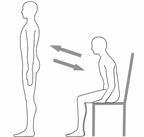
The sit-to-stand exercise is among one of the best exercises for seniors. It strengthens your lower body and can improve general mobility, and helps make standing up from a chair easier. Eventually, as your strength improves, the goal is to do the sit-to-stand exercise without using your hands.
It is normal to feel mild stretching, pulling, tightness, or discomfort as you do this exercise, but you should stop right away if you feel pain.
How to do the exercise:
- Sit on a sturdy chair. Your knees should be bent and your feet should be flat on the floor and shoulder-width apart.
- Place your hands lightly on each side of the seat. Keep your back and neck as straight as possible, with your chest slightly forward.
- Breathe in slowly. Lean forward and slightly shift your weight to the front of your feet.
- Breathe out as you slowly stand up. Try to use as little support from your hands as possible.
- Stand and pause for a full breath in and out.
- Breathe in as you sit down slowly. Tighten your core and abdominal muscles to control your lowering as much as possible.
- Breathe out slowly.
- Rest for 1 minute, then do another set of 5-8 repetitions. Repeat for a total of 3 sets if comfortable.
Knee Extensions
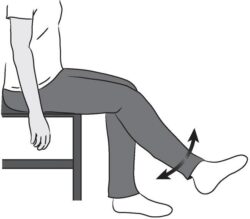
Knee extension exercises are used to strengthen thigh muscles. These are big muscles in our body and improving thigh muscle strength can improve mobility, reduce knee injury risk, and rehabilitate knee injuries.
How to do the exercise:
- Sitting up tall with your shoulders back and down.
- Lifting one leg up, extending at the knee.
- Hold briefly at the top of the movement, squeezing the muscles at the front of the thigh before lowering your leg back down.
- Ensure the movement is slow and controlled.
- Alternate legs, ensuring full knee extension (leg completely straight).
- Rest for 1 minute, then do another set of 5-8 repetitions. Repeat for a total of 3 sets if comfortable.
Core twists
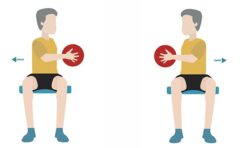
Cores twists are a fantastic exercise that not only improve the strength of your trunk muscles, including back and ad muscle, but they also help with twisting mobility.
How to do the exercise:
- Grab a medicine ball (or similar object).
- Sit comfortably in the chair toward the edge of the seat for extra room. Keep the core (abs and lumbar) tight. Stick the chest out. Both hands should be in front of the body gripping the sides of the medicine ball, with elbows bent.
- Lift the ball a couple inches off the lap then rotate the upper body to the right, keeping the ball in front of the body.
- Rotate to the middle of the body then rotate to the left, finish by rotating back to the middle.
- Each “rep” is one full rotation.
- Rest for 1 minute, then do another set of 5-8 repetitions. Repeat for a total of 3 sets if comfortable.
Seated Shoulder Press
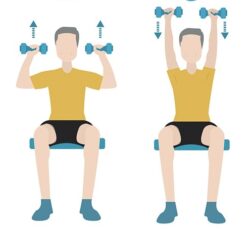
This exercise will help to increase strength and mobility of the shoulders. Please be cautious with this exercise if you have any shoulder contraindications, and/or consult with your physician.
How to do this exercise:
- Choose a pair of low weight dumbbells or do without weights.
- Sit comfortably in the chair with the hips as far back as possible. Ensure that the back is firm to the backrest of the chair.
- Keep your core tight.
- Start with both elbows spread to the sides of the body and align them under the shoulders. Stick the chest out.
- Face the body straight, palms forward, gripping the dumbbells.
- Extend the arms up, reaching above the head until they’re fully extended (or get to a range that feels most comfortable). Don’t touch the hands together and keep both arms parallel to each other.
- Once the arm’s extension limit has been reached, slowly bring the hands down to the starting position, keeping the elbows spread. Don’t tuck the elbows toward the middle of the body, extend them out till the top of the back feels a pinching sensation (not hurting) at the shoulder blades.
Seated Knee Lifts
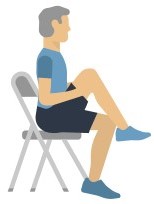
Knee lifts exercise and strengthen the hip flexors, and quads. Each is an important muscle for sitting and standing.
How to do the exercise:
- Sit on a sturdy chair, keeping the back straight and holding the sides for support if needed. Avoid leaning back.
- Slowly lift the right knee slowly towards your chest, then back to the beginning position with control.
- Repeat the motion using the left leg.
- Alternate the legs. Remember to keep your back straight and avoid leaning back to gain new heights.
Seated Chest Press
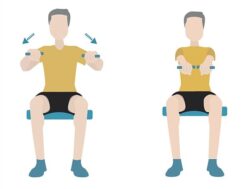
The seated chest press will exercise your chest muscles, shoulders, and triceps.
How to do the exercise:
This exercise can be done with a resistance band, dumbells or with no weight all. Choose the option that best meets your fitness level.
- Place the resistance band/weights/or empty fists at a point on the chair where it’s directly behind the back just under where the shoulder blades would be. Ensure that the resistance band isn’t able to move on the back of the chair; moving it during the exercise can result in injury or target the wrong muscle groups.
- Sit comfortably in the chair with the hips as far back as possible. Ensure that the back is firm to the backrest of the chair.
- Keep the core muscles tight. Stick your chest out.
- Keep both palms down, elbows bent and parallel to the shoulders. Both hands should be positioned just outside of shoulder width.
- Push the resistance band forward until the arms are fully extended in front of the body (don’t touch hands together).
- Slowly reverse the movement back to starting position.
Some General Tips
Remember, starting a new exercise routine will take some practice and “getting used to.” Don’t get discouraged if you can’t do an exercise or can only do a few repetitions.
Here are few things that are normal when starting a new exercise regimen. It’s normal to:
- feel tired when starting an exercise routine.
- have muscle soreness that lasts a few days. As you get stronger, you may not feel muscle soreness.
Here are some tips that can help make your new exercise journey easier:
- Use smooth, steady movements.
- Do not hold your breath during strength exercises. This can cause unsafe changes in your blood pressure.
- Breathe in slowly through your nose, and breathe out slowly through your mouth.
Most importantly, Always consult with a physician before beginning any exercise program.
Keeping Seniors in Their Homes, It’s What We Do.
At Senior LIFE, we focus on taking care of the whole person so that they can maintain their independence for as long as possible. We offer various types of therapy for members. Depending on members’ individual care plans, they may receive any or all of the therapies we offer.
- Occupational Therapy
- Physical Therapy
- Speech/Language Therapy
- Recreational Therapy
We are committed to keeping members independent as long as possible. There are no limits on rehabilitation or the amount of therapy services a member can receive.
Our care offerings don’t stop at therapies. We also offer all the medical and supportive services our members need. These services can include physicians and specialists, nursing care, physical, occupational and speech therapies, personal and home care, medications, meals and nutritional counseling, eye, dental and foot care, durable medical equipment and other medically necessary services.
Other Articles You May Like
How a Home Maintenance Plan Frees Up Your Time
Aging should be about enjoying the comfort of homenot worrying about whether its still safe to live there. At TruBlue, we believe every senior deserves to feel confident, supported, and secure in the home they love. Thats why we provide professional home safety modifications and ongoing home maintenance, tailored specifically for older adults who want to age in place with dignity.Aging in Place Is the GoalBut Safety Comes First75% of adults aged 50 and older want to remain in their current homes as they age, according to a 2024 AARP study.But most homes werent designed to support long-term independence. Even small updates like adding grab bars, improving lighting, or adjusting door thresholds can dramatically reduce fall risk and make daily activities easier.Thats where TruBlue comes in.What Senior Home Modifications Can IncludeEvery home is different. Our team takes time to assess each space and recommend modifications that truly make a difference. Some of the most impactful changes we offer include:Grab bars and safety rails in bathrooms and stairwaysZero-threshold entries and widened doorways for walkers or wheelchairsNon-slip flooring to reduce fall risksImproved lighting in dim or high-traffic areasSmart door handles and lever fixtures for easier useThese adjustments dont just improve safetythey empower seniors to live with more ease, comfort, and confidence.Trusted, Compassionate TechniciansTruBlue technicians are trained, background-checked, and many are certified through Age Safe America, so you can feel confident youre working with professionals who genuinely care. We treat every project like its for our own familybecause thats the TruBlue way.Were not just handymen. Were your Home Ally here to make sure every senior feels secure, supported, and seen.Ongoing Support with the Maintenance PlanModifying a home for safety is just the start. Ongoing upkeep can be just as important for long-term peace of mind. Our Maintenance Plan offers:Quarterly home checkupsProactive seasonal maintenanceA trusted technician you can count onPriority scheduling when issues ariseIts a simple, stress-free way to ensure a home remains safe and well-maintained, without burdening family members.Start a Conversation TodayWhether youre helping a parent stay independent or planning for your own future, TruBlue is here to help. We make it easier to age in place, safely and confidently with services you can trust and people who truly care.Lets create a safer home together.
Retiring Early? Your Health Coverage Strategy Just Became Mission-Critical
Suppose youre an early retiree living on a fixed income. In that case, 2026 brings confirmed changes you need to understandespecially around staying under the 400% Federal Poverty Level (FPL) to maintain ACA premium subsidies.The Two Key Updates:Enhanced ACA tax credits will expire after 2025.Congress has now passed legislation letting the expanded premium tax credits (originating in the American Rescue Plan and extended by the Inflation Reduction Act) lapse beginning in 2026.The subsidy cliff returns in 2026. With enhanced credits eliminated, the traditional cutoff at 400% FPL is reinstated, and crossing that threshold could result in the loss of all subsidy eligibility, leading to significant premium increases. What Early Retirees Should Know On-Exchange (Marketplace) Plans:Subsidy eligibility will once again be limited to households at or below 400% FPL. Exceeding that income level in 2026 could mean losing all premium assistance and facing significantly higher costs.Off-Exchange Plans:These are direct-to-carrier, full-price planswith no subsidies or Marketplace involvement. Silver options might offer better pricing directly through the carrier than on the Marketplace.Consider Smart Income Planning:To retain subsidies, many early retirees are working with both their broker and financial advisor to manage how income is recognized throughout the yearsuch as timing withdrawals or shifting income sourcesto remain under the 400% FPL threshold.This is not financial advicejust a reminder to consult trusted professionals. Aligning your retirement income strategy with your healthcare needs can help maintain premium support until you become eligible for Medicare.Why It Matters:Exceeding 400% FPL in 2026 could result in hundreds of dollars more per month in premiums.With no Medicare yet, coverage costs could remain high for years.Thoughtful income planning now can preserve subsidies during your critical early retirement years.Final Thoughts:As an early retiree, planning is essential. Your health coverage and income are deeply interconnected, primarily through 2026 and beyond.To navigate these changes successfully:-Consult both your financial advisor and your health insurance broker-Monitor your FPL percentage annually.-Strategize income timing and coverage decisions together. If youd like to explore your optionsor are curious how this applies to your householdplease feel free to reach out to us at Baker Consulting Services at 724-594-7648.
Providing Living Assistance without Intruding
If you or a loved one needs more hands-on care, living assistance can help put your mind at ease. Living assistance is flexible, personalized, and fosters a safe home environment while maintaining a sense of independence and privacy. It can give you or your loved one the freedom to make everyday choices and receive a helping hand whenever needed.At St. Barnabas, we understand that the transition from full to partial independence isnt easy and how important it is to ensure your needs and preferences are both addressed. Here are a few ways living assistance is provided without intruding.Receiving Help As NeededEncouraging independence is one way to foster non-intrusive assistance. At a senior living assistance campus, the staff is always available to lend a hand without eliminating decision-making. You or your loved one can retain a sense of autonomy by participating in the daily tasks and chores and receiving help on an as-needed basis. Intervention comes in varying degrees, depending on individual ability. A personalized care plan may include: Incontinence support Wheelchair assistance Medication management Help with grooming, dressing, and bathing Wound, ostomy, or catheter care Care staff is attentive and sensitive to your needs, and they can offer a little help throughout the day or when needed. By participating in daily activities, you or your loved one can plan your day based on your personal preferences.Collaborative SchedulingAs an alternative to making a pre-set schedule and asking the resident to stick to it, working together to create a personal care plan that suits everyone can be beneficial. When it comes to weekly meals, exercise routines, and social activities, residents have the freedom to choose. Maybe they enjoy hearty, home-cooked meals, or perhaps they like to do stretching exercises versus walks. Wherever passions lie, the staff can incorporate those into the regular daily routine to help encourage healthy living and socialization in ways that suit personal preferences.Collaborating with staff can also ensure that activities are both enjoyable and safe. When a resident cant do an activity they love, the team can work with them to find ways to feel that same sense of joy without putting them in danger.Respecting Boundaries and Private SpacesSpending time alone gives us a chance to relax, decompress, and gather our thoughts. In a living assistance care center, its imperative that residents still have some time for themselves. Caregivers respect boundaries and private spaces. Before entering a room, they knock on the door and wait for the resident to respond. Designating a private area for residents to turn to when they feel overwhelmed also aids in creating independence and ultimately gives them a space to de-stress and unwind.Places like the bathroom or shower are understandably uncomfortable areas for intrusion, so caregivers are sure to give residents the space they need to complete these tasks in private. The staff still makes sure the resident is safe by remaining nearby and listening for signs that something may be wrong. Learn More about Living Assistance at St. Barnabas Serving the Greater Pittsburgh, Pennsylvania area, including Allegheny, Beaver, and Butler counties, St. Barnabas is here to give you the support you need. With a dedication to providing comfortable and compassionate living assistance services, you can count on us for all of your care requirements. To learn more about our senior living assistance program, contact us today.
Local Services By This Author
Senior LIFE Washington
LIFE Programs 2114 North Franklin Drive, Washington, Pennsylvania, 15301The Senior LIFE program, also known as Living Independence for the Elderly (LIFE), is a comprehensive healthcare and support services program designed to help older adults aged 55 and above live independently in their homes and communities for as long as possible, rather than moving to a nursing home. Senior LIFE is a Medicare and Medicaid approved long-term care program that offers a wide range of medical and non-medical services to eligible individuals. It is a one-stop solution for all healthcare needs, providing a dedicated team of professionals, including doctors, nurses, social workers, therapists, and home care coordinators. The program aims to enhance the quality of life for seniors by enabling them to remain in the comfort of their own homes while receiving the necessary care and support.Eligibility and CostTo be eligible for Senior LIFE, individuals must meet certain age, location, and medical criteria. If eligible for Medicaid and living in the community, there are no monthly premiums, deductibles, or copayments for any approved drug, service, or care provided by Senior LIFE. For those eligible for Medicare but not Medicaid, a monthly premium is charged. Private pay options are also available for those who do not qualify for Medicare or Medicaid.Services ProvidedSenior LIFE offers a comprehensive array of services tailored to each member's individual needs. Upon enrollment, members and their families work with an interdisciplinary team to develop a personalized care plan. This plan is regularly reviewed and adjusted as the member's needs change. The services provided by Senior LIFE include:Medical Services:- Primary care physician and nursing services- Specialist consultations- Medication management- Diagnostic services (e.g., lab tests, X-rays)- Hospital and nursing home care (when needed)Therapies:- Physical, occupational, and speech therapies- Rehabilitation servicesPersonal Care:- Assistance with activities of daily living (e.g., bathing, dressing, grooming)- Meal preparation and nutritional counseling- Light housekeeping and laundry servicesSocial and Emotional Support:- Social work services and counseling- Recreational activities and socialization opportunities- Dementia care and support Transportation:- Door-to-door transportation to and from the Senior LIFE center and medical appointmentsPalliative Care:- Specialized care for members with life-limiting illnesses- End-of-life care and supportSenior LIFE CentersSenior LIFE operates health and wellness centers in various locations, which serve as hubs for members to receive services. These centers are staffed by healthcare professionals and offer a warm, inviting environment for members to socialize, receive hot meals, see their doctors, and participate in therapies and activities.Interdisciplinary Team Approach - One of the key strengths of the Senior LIFE program is its interdisciplinary team approach. Each member's care is coordinated by a dedicated team of professionals who work together to address their unique needs. This team-based approach ensures that members receive comprehensive and integrated care, with seamless communication and collaboration among all providers.Quality of Life and IndependenceThe goal of Senior LIFE is to enhance the quality of life for older adults and promote their independence. By providing a wide range of services and support, the program aims to help seniors remain active, engaged, and living safely in their own homes and communities for as long as possible, avoiding or delaying the need for nursing home placement. Senior LIFE offers a comprehensive and coordinated approach to caring for older adults, providing a one-stop solution for all their medical, social, and personal care needs. With its dedicated team of professionals, personalized care plans, and commitment to promoting independence and quality of life, the program serves as a valuable alternative to nursing home care for eligible seniors.Contact us to learn more!
Senior LIFE Greene
LIFE Programs 100 EverGreene Drive, Waynesburg, Pennsylvania, 15370The Senior LIFE program, also known as Living Independence for the Elderly (LIFE), is a comprehensive healthcare and support services program designed to help older adults aged 55 and above live independently in their homes and communities for as long as possible, rather than moving to a nursing home. Senior LIFE is a Medicare and Medicaid approved long-term care program that offers a wide range of medical and non-medical services to eligible individuals. It is a one-stop solution for all healthcare needs, providing a dedicated team of professionals, including doctors, nurses, social workers, therapists, and home care coordinators. The program aims to enhance the quality of life for seniors by enabling them to remain in the comfort of their own homes while receiving the necessary care and support.Eligibility and CostTo be eligible for Senior LIFE, individuals must meet certain age, location, and medical criteria. If eligible for Medicaid and living in the community, there are no monthly premiums, deductibles, or copayments for any approved drug, service, or care provided by Senior LIFE. For those eligible for Medicare but not Medicaid, a monthly premium is charged. Private pay options are also available for those who do not qualify for Medicare or Medicaid.Services ProvidedSenior LIFE offers a comprehensive array of services tailored to each member's individual needs. Upon enrollment, members and their families work with an interdisciplinary team to develop a personalized care plan. This plan is regularly reviewed and adjusted as the member's needs change. The services provided by Senior LIFE include:Medical Services:- Primary care physician and nursing services- Specialist consultations- Medication management- Diagnostic services (e.g., lab tests, X-rays)- Hospital and nursing home care (when needed)Therapies:- Physical, occupational, and speech therapies- Rehabilitation servicesPersonal Care:- Assistance with activities of daily living (e.g., bathing, dressing, grooming)- Meal preparation and nutritional counseling- Light housekeeping and laundry servicesSocial and Emotional Support:- Social work services and counseling- Recreational activities and socialization opportunities- Dementia care and support Transportation:- Door-to-door transportation to and from the Senior LIFE center and medical appointmentsPalliative Care:- Specialized care for members with life-limiting illnesses- End-of-life care and supportSenior LIFE CentersSenior LIFE operates health and wellness centers in various locations, which serve as hubs for members to receive services. These centers are staffed by healthcare professionals and offer a warm, inviting environment for members to socialize, receive hot meals, see their doctors, and participate in therapies and activities.Interdisciplinary Team Approach - One of the key strengths of the Senior LIFE program is its interdisciplinary team approach. Each member's care is coordinated by a dedicated team of professionals who work together to address their unique needs. This team-based approach ensures that members receive comprehensive and integrated care, with seamless communication and collaboration among all providers.Quality of Life and IndependenceThe goal of Senior LIFE is to enhance the quality of life for older adults and promote their independence. By providing a wide range of services and support, the program aims to help seniors remain active, engaged, and living safely in their own homes and communities for as long as possible, avoiding or delaying the need for nursing home placement. Senior LIFE offers a comprehensive and coordinated approach to caring for older adults, providing a one-stop solution for all their medical, social, and personal care needs. With its dedicated team of professionals, personalized care plans, and commitment to promoting independence and quality of life, the program serves as a valuable alternative to nursing home care for eligible seniors.Contact us to learn more!
Senior LIFE Greensburg
LIFE Programs 123 Triangle Drive, Greensburg, Pennsylvania, 15601The Senior LIFE program, also known as Living Independence for the Elderly (LIFE), is a comprehensive healthcare and support services program designed to help older adults aged 55 and above live independently in their homes and communities for as long as possible, rather than moving to a nursing home. Senior LIFE is a Medicare and Medicaid approved long-term care program that offers a wide range of medical and non-medical services to eligible individuals. It is a one-stop solution for all healthcare needs, providing a dedicated team of professionals, including doctors, nurses, social workers, therapists, and home care coordinators. The program aims to enhance the quality of life for seniors by enabling them to remain in the comfort of their own homes while receiving the necessary care and support.Eligibility and CostTo be eligible for Senior LIFE, individuals must meet certain age, location, and medical criteria. If eligible for Medicaid and living in the community, there are no monthly premiums, deductibles, or copayments for any approved drug, service, or care provided by Senior LIFE. For those eligible for Medicare but not Medicaid, a monthly premium is charged. Private pay options are also available for those who do not qualify for Medicare or Medicaid.Services ProvidedSenior LIFE offers a comprehensive array of services tailored to each member's individual needs. Upon enrollment, members and their families work with an interdisciplinary team to develop a personalized care plan. This plan is regularly reviewed and adjusted as the member's needs change. The services provided by Senior LIFE include:Medical Services:- Primary care physician and nursing services- Specialist consultations- Medication management- Diagnostic services (e.g., lab tests, X-rays)- Hospital and nursing home care (when needed)Therapies:- Physical, occupational, and speech therapies- Rehabilitation servicesPersonal Care:- Assistance with activities of daily living (e.g., bathing, dressing, grooming)- Meal preparation and nutritional counseling- Light housekeeping and laundry servicesSocial and Emotional Support:- Social work services and counseling- Recreational activities and socialization opportunities- Dementia care and support Transportation:- Door-to-door transportation to and from the Senior LIFE center and medical appointmentsPalliative Care:- Specialized care for members with life-limiting illnesses- End-of-life care and supportSenior LIFE CentersSenior LIFE operates health and wellness centers in various locations, which serve as hubs for members to receive services. These centers are staffed by healthcare professionals and offer a warm, inviting environment for members to socialize, receive hot meals, see their doctors, and participate in therapies and activities.Interdisciplinary Team Approach - One of the key strengths of the Senior LIFE program is its interdisciplinary team approach. Each member's care is coordinated by a dedicated team of professionals who work together to address their unique needs. This team-based approach ensures that members receive comprehensive and integrated care, with seamless communication and collaboration among all providers.Quality of Life and IndependenceThe goal of Senior LIFE is to enhance the quality of life for older adults and promote their independence. By providing a wide range of services and support, the program aims to help seniors remain active, engaged, and living safely in their own homes and communities for as long as possible, avoiding or delaying the need for nursing home placement. Senior LIFE offers a comprehensive and coordinated approach to caring for older adults, providing a one-stop solution for all their medical, social, and personal care needs. With its dedicated team of professionals, personalized care plans, and commitment to promoting independence and quality of life, the program serves as a valuable alternative to nursing home care for eligible seniors.Contact us to learn more!
